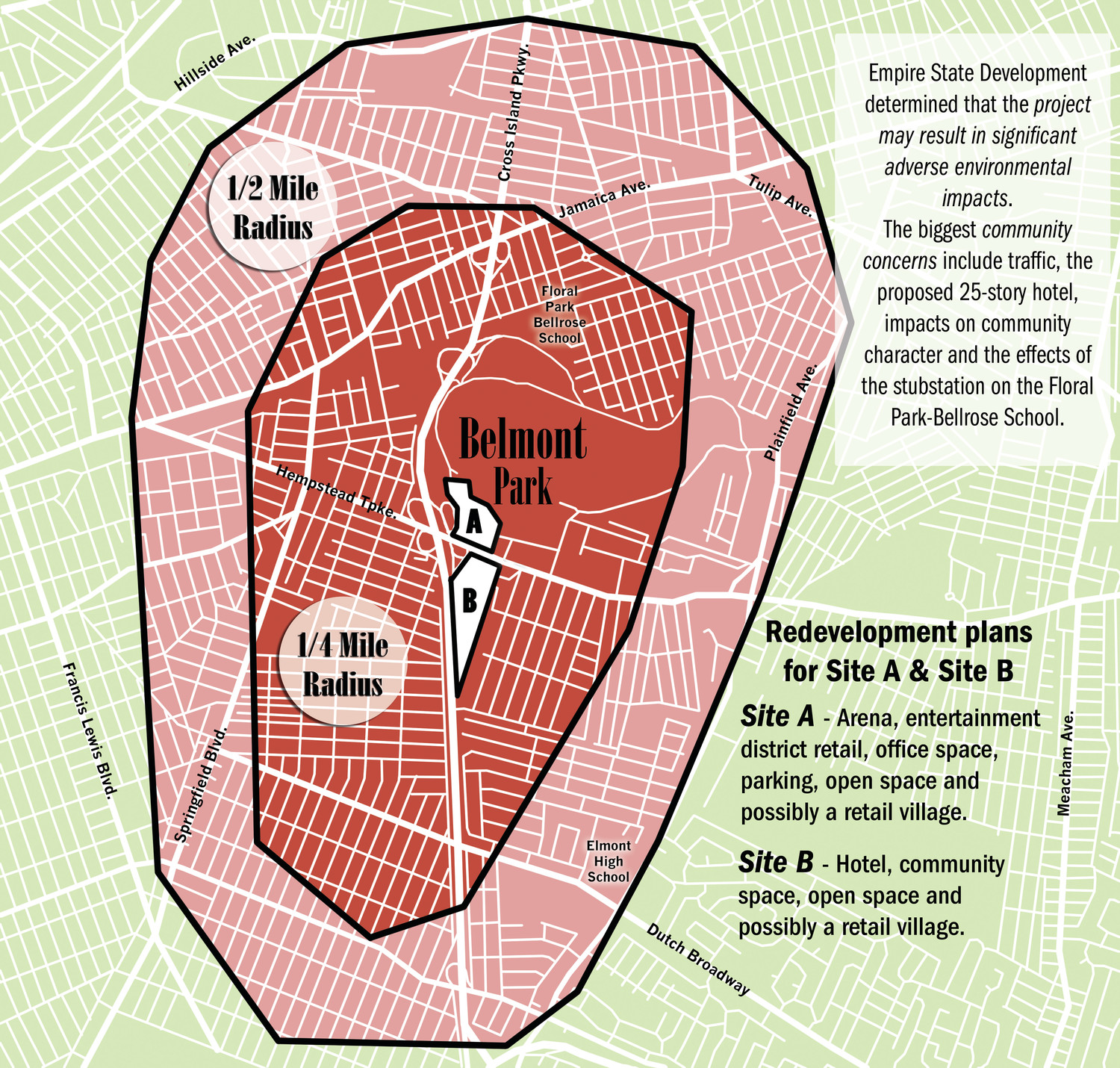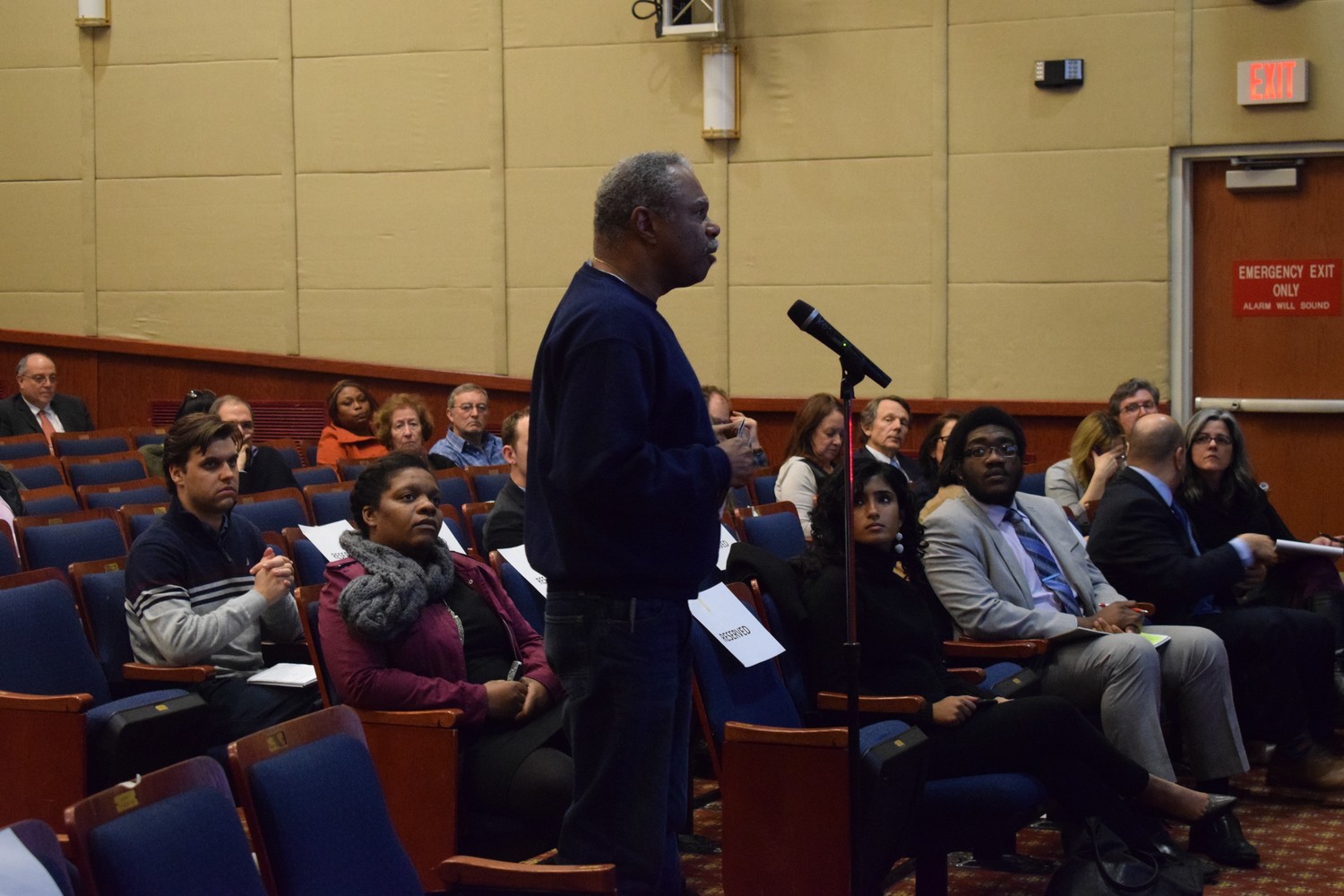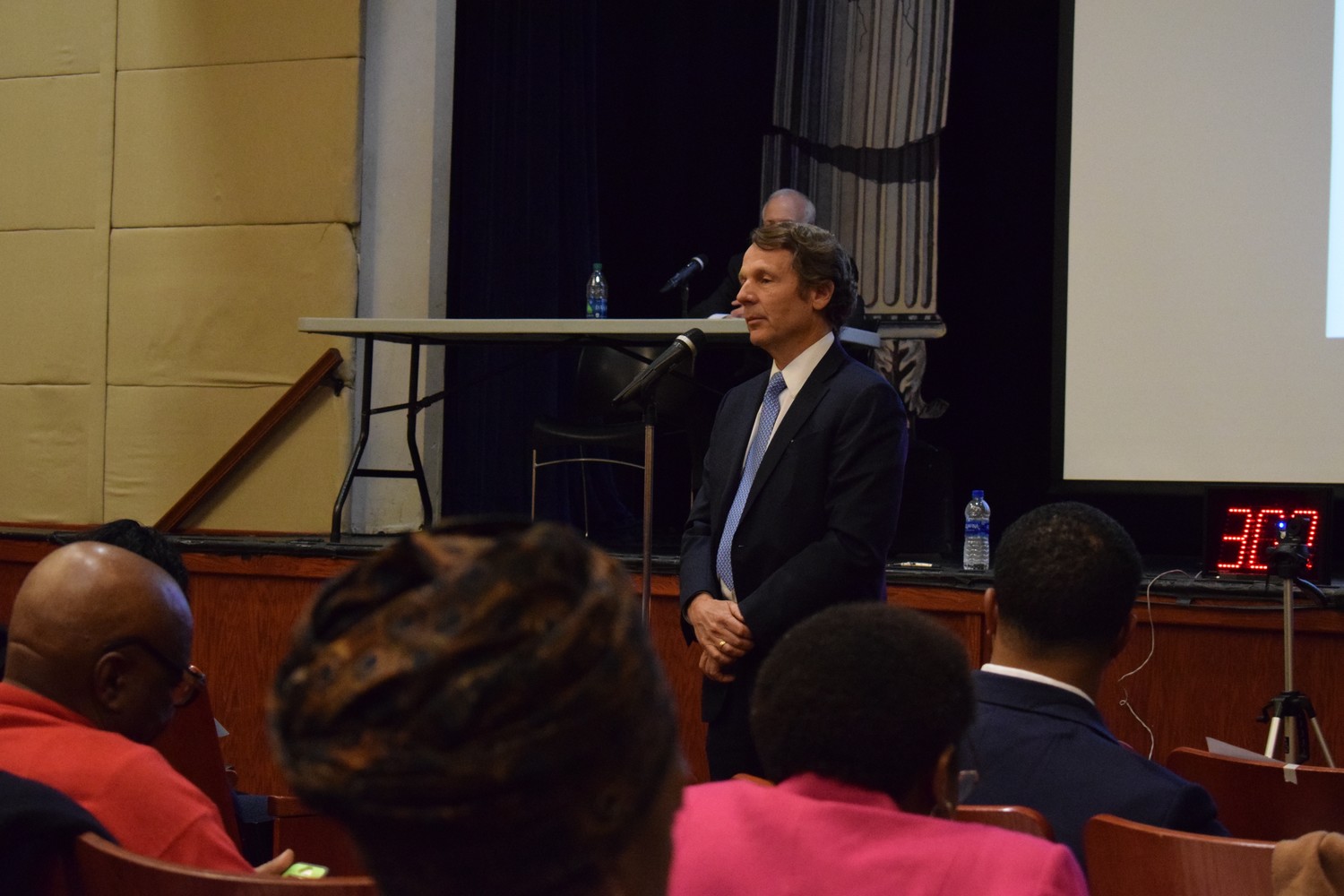Belmont scoping session reveals rifts
Substation, hotel, traffic among key concerns
The public got its first chance since last December to comment on or air grievances about a plan to bring the Islanders hockey franchise to Belmont Park during a scoping session on March 22. The meeting took place at Elmont’s Memorial Library, and despite having been billed as two two-hour sessions, ran almost continuously from 3:30 to 9:30 p.m.
Edward Kramer, from New York Arena Partners LLC, moderated. Arena Partners is the joint venture formed by Madison Square Garden, the Oak View Group, the Scott Malkin Group and Sterling Equities to build the 18,000-seat Belmont arena that will be the new home of the Islanders.
The purpose of the scoping session, Kramer said, was to outline the extent of the Environmental Impact Study, as required by the State Environmental Quality Review Act, as well as changes that Arena Partners had made to the project since its unveiling more than four months ago.
“This is not a Q and A,” Kramer said. “We will have a Q and A on April 24,” which is to be attended by members of the development team. The public comment period, originally set to expire on April 7, was extended to April 12.
Richard Browne, managing partner of Sterling Property Development, a division of Sterling Equity, gave an overview of the project to date, emphasizing that how the final project is to take shape would depend on many factors, including the findings contained in the EIS and feedback from the local communities. He added that no contracts had yet been signed.
Islanders co-owner and Value Retail CEO Scott Malkin disliked the placement of the retail spaces because they were too close together, Browne said. “So we decided to move the hotel and retail space south of Hempstead Turnpike to the ‘B’ site, which was originally designed to contain most of the parking.” The addition of a 40,000-square-foot power substation was the only other major design change, he said.
Residents spoke of four major areas of concern in the updated design: the location of the substation, the height of the hotel, traffic and the potential damage to the overall quality of life in the surrounding communities. In addition, a number of citizens groups and civic associations expressed concern about a lack of transparency in the development process.
Most speakers favored development of the site; their issue was how it would be redone. “I’ve been fighting for redevelopment at Belmont Park for 10 years,” said Cheryl Lee, president of the Parkhurst Civic Association. “We need it to be right. We’ve all moved here from Brooklyn or Queens or other parts of the Island to the only place we could buy homes. We want to be treated like other villages get treated, like how Garden City got treated with the Roosevelt Field development — fairly.”
“This is one of the shortest public comment periods I’ve ever heard of,” Nassau County Legislator Carrié Solages, a Democrat from Elmont, said. “Belmont Park is the last place for development in Nassau County. We’ve seen pushes for soccer stadiums and casinos go unbuilt. We don’t want a half-finished project to be abandoned because we rushed into this.”
“We need a comprehensive plan for the surrounding communities,” agreed Tammie Williams, president of the Belmont Park Citizens Coalition. “We’re concerned about the disregard of the communities in this redevelopment deal. We want transparency. We need to know if this can bring tax revenue, high-paying jobs and beautification for Belmont.”
A number of Floral Park residents said they were upset by the proposed location of the substation, which would be next to a school. “Why does the substation have to be so close to more than 1,000 children?” asked Floral Park-Bellrose Union Free School District Superintendent Dr. Michael Dantona. “We’re also concerned about the proximity of strangers so close to our school. The substation would only be separated from the school by a fence.”
“The substation can’t be next to a school,” Floral Park Mayor Dominick Longobardi said.
State Sen. Elaine Phillips, a Republican from Flower Hill, echoed Longobardi. “A power station near a Floral Park school is inappropriate — a total nonstarter,” she said. “You must provide a barrier along the southern lot.”
Hempstead Town Supervisor Laura Gillen expressed similar concerns. While calling the project “an exciting opportunity,” she also wanted to know who would bear the cost of the substation’s construction. Further, “this must be ‘green’ development,” she said. In light of the design changes, Gillen also wanted the comment period extended beyond its current April 12 cutoff, as well as a community hotline during construction.
“We had PSEG draw up a list of possible locations” for the substation, Sterling’s Browne said. “But we didn’t realize they’d make the list public, or that they’d include a location near a school.”
The updated version of the plan also calls for the 240-bed hotel included in the original proposal to be 25 stories high, which would make it one of the tallest buildings in Nassau County, and the tallest building in the area. “The height of the hotel is a concern,” Gillen said.
“The hotel must not be higher than the grandstand,” said Floral Park’s Longobardi, an opinion shared by many who spoke.
Traffic concerns
Nearly everyone referred to the twin issues of traffic and parking. The current proposal provides for 3,700 parking spots at the park, but makes no provision for upgrades to either local streets or to the two parkways that would be the main conduits to and from events. And while Browne was adamant in his Dec. 10 presentation that a fully functioning LIRR station at Belmont Park was essential to the project, no discussions have been held about how that might be achieved — or at what cost.
“Anything less than a 24/7 railroad station is unacceptable,” Parkhurst Vice President Aubrey Phillips said.
Without upgrades to area streets, Belmont area residents said they anticipate problems. “Dutch Broadway is a secondary road that will be flooded with cars trying to avoid traffic on Hempstead Turnpike,” Elmont resident Ferida Khan said.
Parkhurst member Ross McDonald wanted to know how the Islanders helped Uniondale in the more than 40 years they played there. “Did the Islanders transform Uniondale? They did not.”

 45.0°,
Mostly Cloudy
45.0°,
Mostly Cloudy 













